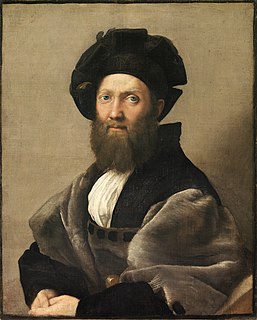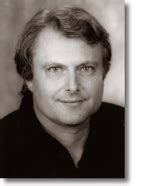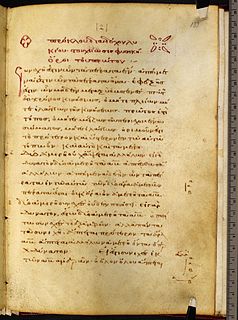A Quote by Baldassare Castiglione
Then the soul, freed from vice, purged by studies of true philosophy, versed in spiritual life, and practised in matters of the intellect, devoted to the contemplation of her own substance, as if awakened from deepest sleep, opens those eyes which all possess but few use, and sees in herself a ray of that light which is the true image of the angelic beauty communicated to her, and of which she then communicates a faint shadow to the body.
Related Quotes
The universal nature has no external space; but the wondrous part of her art is that though she has circumscribed herself, everything which is within her which appears to decay and to grow old and to be useless she changes into herself, and again makes other new things from these very same, so that she requires neither substance from without nor wants a place into which she may cast that which decays. She is content then with her own space, and her own matter, and her own art.
She was incomprehensible, for, in her, soul and spirit were one - the beauty of her body was the essence of her soul. She was that unity sought for by philosophers through many centuries. In this outdoor waiting room of winds and stars she had been sitting for a hundred years, at peace in the contemplation of herself.
A woman cannot live in the light of intellect. Society forbids it. Those conventional frivolities, which are called her 'duties', forbid it. Her 'domestic duties', high-sounding words, which, for the most part, are but bad habits (which she has not the courage to enfranchise herself from, the strength to break through), forbid it.
I took one glance at her in that hospital bed under the dull light and recognised the look on her face, which I'd seen on donors often enough before. It was like she was willing her eyes to see right inside herself, so she could patrol and marshal all the better the separate areas of pain in her body.
Woman does not possess the image of God in herself but only when taken together with the male who is her head, so that the whole substance is one image. But when she is assigned the role as helpmate, a function that pertains to her alone, then she is not the image of God. But as far as the man is concerned, he is by himself alone the image of God just as fully and completely as when he and the woman are joined together into one.
My wife, my Mary, goes to her sleep the way you would close the door of a closet. So many times I have watched her with envy. Her lovely body squirms a moment as though she fitted herself into a cocoon. She sighs once and at the end of it her eyes close and her lips, untroubled, fall into that wise and remote smile of the Ancient Greek gods. She smiles all night in her sleep, her breath purrs in her throat, not a snore, a kitten's purr... She loves to sleep and sleep welcomes her.
The region belonging to the pure intellect is straitened: the imagination labours to extend its territories, to give it room. She sweeps across the boarders, searching out new lands into which she may guide her plodding brother. The imagination is the light which redeems from the darkness for the eyes of the understanding. Novalis says, 'The imagination is the stuff of the intellect' -affords, that is, the material upon which the intellect works.
I value in the cat the independent and almost ungrateful spirit which prevents her from attaching herself to any one, the indifference with which she passes from the salon to the housetop. When we caress her, she stretches herself and arches her back responsively; but this is because she feels an agreeable sensation, not because she takes a silly satisfaction, like the dog, in faithfully loving a thankless master. The cat lives alone, has no need of society, obeys only when she pleases, pretends to sleep that she may see more clearly, and scratches everything on which she can lay her paw.
Standards of beauty describe in precise terms the relationship that an individual will have to her own body. They prescribe her mobility, spontaneity, posture, gait, the uses to which she can use her body. They define precisely the dimension of her physical freedom and psychological development, intellectual possibility, and creative potential is an umbilical one.
She died that night. Her last breath took her soul, I saw it in my dream. I saw her soul leave her body as she exhaled, and then she had no more needs, no more reason; she was released from her body, and being released, she continued her journey elsewhere, high in the firmament where soul material gathers and plays out all the dreams and joys of which we temporal beings can barely conceive, all the things that are beyond our comprehension, but even so, are not beyond our attainment if we choose to attain them, and believe that we truly can.
There was a warmth of fury in his last phrases. He meant she loved him more than he her. Perhaps he could not love her. Perhaps she had not in herself that which he wanted. It was the deepest motive of her soul, this self-mistrust. It was so deep she dared neither realise nor acknowledge. Perhaps she was deficient. Like an infinitely subtle shame, it kept her always back. If it were so, she would do without him. She would never let herself want him. She would merely see.
She had lost herself somewhere along the frontier between her inventions, her stories, her fantasies and her true self. The boundaries had become effaced, the tracks lost, she had walked into pure chaos, and not a chaos which carried her like the galloping of romantic riders in operas and legends, but which suddenly revealed the stage props: a papier-mâché horse.
Leave those vain moralists, my friend, and return to the depth of your soul: that is where you will always rediscover the source of the sacred fire which so often inflamed us with love of the sublime virtues; that is where you will see the eternal image of true beauty, the contemplation of which inspires us with a holy enthusiasm.








































